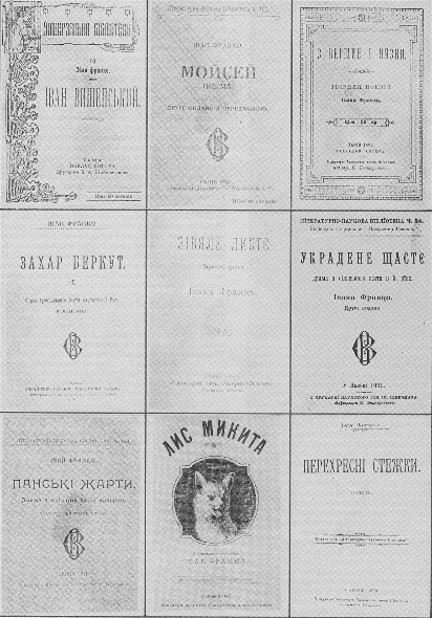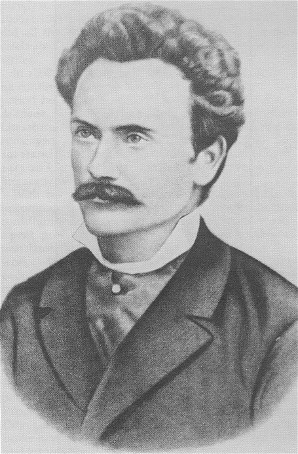Franko, Ivan
Franko, Ivan (pseuds: Dzhedzhalyk, Zhyvyi, Kremin, Myron, etc), b 27 August 1856 in Nahuievychi, Drohobych county, Galicia, d 28 May 1916 in Lviv. Writer, scholar, political and civic leader, publicist; like Taras Shevchenko, one of Ukraine's greatest creative geniuses. The son of a village blacksmith, Franko graduated from the Drohobych gymnasium in 1875 and began to study classical philology and Ukrainian language and literature at Lviv University. His first literary works—poetry (1874) and the novel Petriï i Dovbushchuky (1875)—were published in the students' magazine Druh, whose editorial board he joined in 1875. Franko's political and publishing activities and his correspondence with Mykhailo Drahomanov attracted the attention of the police, and in 1877 he was arrested along with Mykhailo Pavlyk, Ostap Terletsky, and others for spreading socialist propaganda. After spending eight months in prison Franko returned to political work with even greater fervor. He helped organize workers' groups in Lviv, contributed articles to the Polish newspaper Praca, and studied the works of Karl Marx and Friedrich Engels. In 1878 he founded with Pavlyk, the magazine Hromads’kyi druh, which was confiscated by the authorities but resumed publication under the names Dzvin and Molot. In 1880 Franko was arrested again and charged with inciting peasants against the authorities. After serving a three-month term, he was released but was kept under police surveillance and was forced to discontinue his university studies.
During the first period of his creative work Franko wrote political poems, such as ‘Kameniari’ (The Stonecutters, 1878), ‘Vichnyi revoliutsioner’ (The Eternal Revolutionary, 1880), and ‘Ne pora ...’ (This Is Not the Time ..., 1880), which became patriotic anthems and influenced the outlook of a whole generation; the novels Boa constrictor (1878), Boryslav smiiet’sia (Boryslav Is Laughing, 1881), and Zakhar Berkut (1883); and a series of literary and journalistic articles. In 1881 Franko co-published the monthly S’vit, and after its closing in 1882 he edited the journal Zoria (Lviv) and the newspaper Dilo (1883–5). Leaving the populists (see Western Ukrainian Populism), who were apprehensive about his radical socialist and revolutionary ideas, Franko tried to set up an independent journal; to find support, he made two trips to Kyiv, in 1885 and 1886. In May 1886 he married O. Khoruzhynska in Kyiv. When the journal failed, Franko joined the staff of a Polish newspaper, Kurjer Lwowski. In referring to the decade (1887–97) that he spent working for the Polish press (he also worked for Przyjaciel ludu) and the German press (Die Zeit), Franko said that he was ‘doing hired labor for the neighbors.’
For a while in 1888 Franko was a contributor to the journal Pravda. His ties with compatriots from Dnieper Ukraine led to a third arrest in 1889. In the following year, with the support of Mykhailo Drahomanov, Franko co-founded the Ruthenian-Ukrainian Radical party and drew up its program. With Mykhailo Pavlyk, he published the party's organs Narod (1890–5) and Khliborob (Lviv, Kolomyia) (1891–5). In 1895, 1897, and 1898 he was the Radical party's candidate for a seat in the Austrian Parliament and the Galician Diet but lost the elections because of manipulations of the administration and provocations of the opposition. (Photo: Ivan Franko in 1896.) In 1899 a crisis arose in the Radical party, and Franko joined the populists in founding the National Democratic party, in which he was active until 1904, when he retired from political life. For many years Franko collaborated in the sociopolitical field with M. Drahomanov, whom he regarded highly as a ‘European political leader,’ but eventually their views on socialism and the national question diverged. Franko parted with Drahomanov, accusing him of tying Ukraine's fate to that of Russia (in ‘Suspil’nopolitychni pohliady M. Drahomanova’ [The Sociopolitical Views of M. Drahomanov, 1906]).
Besides his political and literary work Franko continued his university studies, first at Chernivtsi University (1891), where he prepared a dissertation on Ivan Vyshensky, and then at Vienna University, where on 1 July 1893 he defended a doctoral dissertation on the spiritual romance Barlaam and Josaphat under the supervision of the eminent Slavist Vatroslav Jagić. In 1894 Franko was appointed lecturer in the history of Ukrainian literature at Lviv University but failed to obtain the chair of Ukrainian literature because of opposition from Vicegerent Kazimierz Badeni and Galician reactionary circles. In 1894–7 he and his wife published the journal Zhytie i slovo, in which many of his articles appeared, among them ‘Sotsiializm i sotsiial-demokratyzm (Socialism and Social Democracy, 1898), a severe criticism of Ukrainian Social Democracy and the socialism of Marx and Engels. In the introduction to the poetry collection Mii izmarahd (My Emerald, 1898) Franko continued his attack on Marxism as ‘a religion founded on dogmas of hatred and class struggle.’
With Mykhailo Hrushevsky's coming to Lviv in 1894, Franko became closely associated with the Shevchenko Scientific Society. In 1899 he became a full member of the society and in 1904 an honorary member. Most of his scholarly works, historical and literary notes, and reviews appeared in Zapysky Naukovoho tovarystva im. Shevchenka Franko worked in the Ethnographic Commission of the Shevchenko Scientific Society and headed the Philological Section (1898–1908). Through the efforts of Franko and Hrushevsky the Shevchenko Scientific Society became akin to an academy of sciences on the eve of the First World War. In 1897 Franko's article in Die Zeit in which he called Adam Mickiewicz the poet of treason (‘Der Dichter des Verrates’) led to the end of his career as a journalist. Henceforth, Franko devoted himself completely to editing Literaturno-naukovyi vistnyk (Lviv 1898–1906) with Hrushevsky and Volodymyr Hnatiuk. Actually, Franko did all the editing. In 1898 the Ukrainian community celebrated the 25th anniversary of Franko's work as a writer.
In 1908 Franko's health began to decline rapidly. Yet, he continued to work to the end of his life. (Photo: Ivan Franko in 1910.) In this last period he wrote Narys istoriï ukraïns’ko-rus’koï literatury do 1890 r. (Outline of the History of Ukrainian-Ruthenian Literature to 1890, 1910) and Studiï nad ukraïns’kymy narodnymy pisniamy (Studies of Ukrainian Folk Songs, 1913) and did numerous translations of ancient poetry. In 1913 all Ukraine celebrated the 40th anniversary of his literary work.
With his many gifts, encyclopedic knowledge, and uncommon capacity for work, Franko made outstanding contributions to many areas of Ukrainian culture. He was a poet, prose writer, playwright, critic, literary historian, translator, and publisher. The themes of his literary works were drawn from the life and struggle of his own people and from sources of world culture: Eastern cultures and the classical and Renaissance traditions. He was a ‘golden bridge’ between Ukrainian and world literatures.
Franko was one of the first realists in Ukrainian literature and the most outstanding poet of the post-Shevchenko period. His second collection, Z vershyn i nyzyn (From the Heights and the Depths, 1887, expanded 1893), which included the masterpieces of his social lyrical poetry, such as ‘Tovarysham z tiurmy’ (To Comrades from Prison), ‘Vichnyi revoliutsioner,’ ‘Kameniari,’ ‘Zemle moia’ (My Land), and ‘Tiuremni sonety’ (Prison Sonnets), broke new ground. It radicalized the younger generation and for this reason was banned in Ukraine under Russia. Franko's Ziv’iale lystia (Withered Leaves, 1896) marks the culmination of his love poetry. Philosophical themes predominated in the collection Mii izmarahd (1898)—reflections on good and evil, beauty, fidelity, duty, and the meaning of life. But the collection also contained some social poetry that depicted the suffering of the Ukrainian people—’Po selakh’ (Through the Villages), ‘Do Brazyliï’ (To Brazil), etc. In the collection Iz dniv zhurby (From the Days of Sorrow, 1900) the poet reflected on his personal fate. The collection Semper tiro (1906) is a poetic statement of the revolutionary poet's own faith. Franko displayed his poetic skills in large epic poems such as Pans’ki zharty (A Landlord's Jests, 1887), Surka (1890), Smert’ Kaïna (The Death of Cain, 1889), and Ivan Vyshens’kyi (1900). His greatest poem, Moisei (Moses, 1905), which in a biblical setting deals with the conflict between a leader and his people and proclaims the ideal of service to one's people, was based to a large extent on autobiographical material.
Franko's prose works include over 100 short stories and dozens of novels. His earliest prose works (beginning in 1877) form the Boryslav cycle, which painted a vivid picture and gave a profound analysis of the social evils that plagued Galicia at the time. The impoverishment and proletarianization of the Galician peasants are the basic themes of the collections V poti chola (In the Sweat of the Brow, 1890) and Halyts’ki obrazky (Galician Pictures, 1885), which include some autobiographical stories such as ‘Malyi Myron’ (Little Myron), ‘Hrytseva shkil’na nauka’ (Hryts's School Lesson), ‘Olivets’‘ (The Pencil), and ‘Schönschreiben’. His greatest masterpieces of prose are the novel Boa constrictor (1878) and the social novel Boryslav smiiet’sia (1881), which for the first time depict the incipient forms of revolutionary struggle among the workers and the spontaneous awakening of workingclass consciousness. Zakhar Berkut (1883), a historical novel based on ancient Ukrainian chronicles, presents the heroic resistance of Ukrainian highlanders to the Mongols in 1241. Franko's other historical novels are Heroi ponevoli (Unwilling Hero, 1904), dealing with the 1848 revolution in Lviv, and Velykyi shum (The Great Noise, 1907), dealing with the abolition of serfdom. Franko dealt with the moral decay of the leading circles in contemporary Galician society in the novels Dlia domashn’oho vohnyshcha (For the Home Hearth, 1897), Osnovy suspil’nosty (The Foundations of Society, 1895), and Perekhresni stezhky (Crossed Paths, 1900). The novel Lel’ i Polel’ (1887) is didactic in character. Franko's prose is noted for its variety of themes, as well as its realistic presentation of the life of the different social strata.
In drama Franko proved himself a master of the sociopsychological and historical play and of comedy. His first attempts in this area date back to his gymnasium days—Iuhurta (1873), Try kniazi na odyn prestol (Three Princes for One Throne, 1874), and others. He wrote the largest number of his plays in the 1890s. His best plays are the sociopsychological drama Ukradene shchastia (Stolen Happiness, 1894) and the historical drama in verse Son kniazia Sviatoslava (The Dream of Prince Sviatoslav, 1895). Of his longer plays the comedies Riabyna (The Rowan Tree, 1886) and Uchytel’ (The Teacher, 1896) are also well known. His best-known one-act plays are Ostannii kreitsar (The Last Kreutzer, 1879), Budka ch. 27 (Hut No. 27, 1893), Kam’iana dusha (The Stone Soul, 1895), Maister Chyrniak (Master Chyrniak, 1896), and Sud sv. Mykolaia (The Trial of Saint Nicholas, 1920). Franko contributed several masterpieces to children's literature, including Lys Mykyta (Fox Mykyta, 1890), Pryhody Don-Kikhota (The Adventures of Don Quixote, 1891), Abu-Kazemovi kaptsi (Abu-Kasim's Slippers, 1895), Koly shche zviri hovoryly (When Animals Still Talked, 1899), and Koval’ Bassim (Bassim the Blacksmith, 1900). Special mention must be made of Franko's work as a translator, which he carried on throughout his life. He translated masterpieces from 14 languages by such famous authors as Homer, Dante, William Shakespeare, J. Goethe, E. Zola, B. Bjørnson, Aleksandr Pushkin, M. Lermontov, N. Chernyshevsky, A. Herzen, N. Nekrasov, A. Mickiewicz, W. Gomulicki, K. Havlíček-Borovský, J. Neruda, J. Machar, H. Ibsen, H. Heine, and others.
Starting with his doctoral dissertation (1893) and qualifying thesis Rozbir ‘Naimychky’ Shevchenka (Analysis of Shevchenko's ‘The Servant Girl,’ 1895), Franko's works on the theory and history of literature and criticism were an important contribution to Ukrainian literary studies. His largest scholarly work was the five-volume Apokryfy i legendy z ukraïns’kykh rukopysiv (Apocrypha and Legends from Ukrainian Manuscripts, 1896–1910), a monumental collection of texts and scholarly analysis. Among his works on old and medieval literature were Karpatorus’ke pys’menstvo XVII–XVIII vv. (Carpatho-Ruthenian Literature of the 17th–18th Centuries, 1900), Sv. Klyment u Korsuni (Saint Clement in Korsun, 1906), and materials on the history of Old Ukrainian drama, particularly of the vertep (Do istoriï ukraïns’koho vertepa XVIII v. [On the History of the Ukrainian Puppet Theater of the 18th Century, 1906]). In modern literature Franko devoted attention to the contributions of Ivan Kotliarevsky, Markiian Shashkevych, Taras Shevchenko, Yurii Fedkovych, Oleksander Konysky, Lesia Ukrainka, Volodymyr Samiilenko, Volodymyr Vynnychenko, and others. He wrote a number of articles on Slavic literatures, particularly on Russian and Polish literature, as well as on Western European literature. His literary studies were summed up in his article ‘Iuzhnoruskaia literatura’ (Southern Russian Literature) in F. Brockhaus and I. Efron's Entsiklopedicheskii slovar’ (Encyclopedic Dictionary, vol 81, 1904) and in Narys istoriï ukraïns’ko-rus’koï literatury do 1890 r. (Outline of the History of Ukrainian-Ruthenian Literature to 1890, 1910). Franko's theoretical views on the purpose of literature were expressed in ‘Z sekretiv poetychnoï tvorchosty’ (On the Secrets of Poetic Creativity, 1898) and ‘Teoriia i rozvii istoriï literatury’ (The Theory and Development of the History of Literature, 1899). He emphasized the social basis of literary work but accepted esthetic qualities as essential to its evaluation. In his studies of literary monuments Franko used the comparative and historical-cultural approach.
In the area of linguistics Franko produced several studies of the Ukrainian literary language, including ‘Etymolohiia i fonetyka v iuzhno-rus’kii literaturi’ (Etymology and Phonetics in Southern Ruthenian Literature, 1894), ‘Literaturna mova i diialekty’ (The Literary Language and Dialects, 1907), and ‘Prychynky do ukraïns'koï onomastyky’ (Materials on Ukrainian Onomastics, 1906). He defended the view that there is only one Ukrainian literary language, based primarily on the Dnieper dialects and enriched with dialects from Western Ukraine. For his philological contributions Franko was awarded an honorary doctorate by Kharkiv University in 1906. He was also elected to a number of Slavic scholarly associations. Aleksei Shakhmatov’s and Fedor Korsh’s recommendation to admit Franko to the Russian Academy of Sciences was rejected by the tsarist government.
In the field of ethnography and folklore Franko collected a wealth of source material and wrote a series of studies and articles about the clothing, food, art, and folk beliefs of the Galician people. These were published in the monthly S’vit, Druh, Zhytie i slovo, Zoria (Lviv), Kievskaia starina, Zapysky Naukovoho tovarystva im. Shevchenka, and elsewhere. In 1898–1913 Franko served as chairman of the Ethnographic Commission of the Shevchenko Scientific Society and co-edited Etnohrafichnyi zbirnyk with Volodymyr Hnatiuk. His main studies of folklore are ‘Deshcho pro Boryslav’ (Something about Boryslav, 1882), Zhinocha nevolia v rus’kykh pisniakh narodnykh (Women's Servitude in Ruthenian Folk Songs, 1883), ‘Jak powstają pieśni ludowe’ (How Folk Songs Originate, 1887), ‘Voiats’ka pisnia’ (The Soldier's Song, 1888), Nashi koliady (Our Carols, 1889), Iz ust naroda (From the Mouths of the People, 1894–5), ‘Eine etnologische Expedition in das Bojkenland’ (1905), and ‘Ohliad prats’ nad etnohrafiieiu Halychyny v XIX st.’ (A Survey of Works on the Ethnography of Galicia in the 19th Century, 1928). Franko's Studiï nad ukraïns’kymy narodnymy pisniamy (Studies of Ukrainian Folk Songs, three volumes of Zapysky NTSh published separately in 1913), in which he used the comparative-historical method, is a fundamental contribution to the field of folklore studies.
Franko formulated his philosophical, sociological, and political ideas in the following studies: ‘Nauka i jej stanowisko wobec klas pracujących’ (Scholarship and Its Attitude to the Working Classes, 1878), ‘Mysli o evoliutsiï v istoriï liuds’kosty’ (Reflections on Evolution in the History of Mankind, 1881–2), and ‘Najnowsze prądy w ludoznawstwie’ (The Newest Trends in Ethnology, 1895). His article ‘Sotsiializm i sotsiial-demokratyzm’ (1897) is a critique of ‘scientific socialism’ and the materialist conception of history. ‘Shcho take postup’ (What Is Progress, 1903) is a survey of sociocultural development and a critique of the communist concept of the state, while ‘Sotsiial’na aktsiia, sotsiial’ne pytannia i sotsiializm’ (Social Action, the Social Question, and Socialism, 1904) is an analysis of Metropolitan Andrei Sheptytsky's pastoral letter on the social question and an essay on the causes of social injustice.
Franko's works in economics deal with the condition of the workers and peasants from a historical viewpoint: ‘Promyslovi robitnyky v skhidnii Halychyni i ïkh plata r. 1870’ (Industrial Workers in Eastern Galicia and Their Wages in 1870, 1881), O pracy (On Work, 1881), ‘Galicyjska własność ziemska’ (Land Ownership in Galicia, 1887 and 1914), ‘Die Auswanderung der galizischen Bauern’ (1892), ‘Die Bauernbewegung in Galizien’ (1895), ‘Hrymalivs’kyi kliuch v 1800 r.’ (Hrymaliv's Key in 1800, 1900), ‘Bauernstrikes in Ostgalizien’ (1902), and Hromads’ki shpykhliri i shpykhlirovyi fond u Halychyni 1784–1840 (Community Storehouses and the Storehouse Fund in Galicia in 1784–1840, 1907).
About a hundred published works, most of them dealing with the peasant movement and the 1848 revolution in Galicia (see Revolution of 1848–9 in the Habsburg monarchy) and with Ukrainian-Polish relations, were the subjects of Franko's sociological, sociopolitical, and historical-economic studies. The first group includes ‘Pol’s’ke povstannia v Halychyni 1846 r.’ (The Polish Revolt in Galicia in 1846, 1884), ‘Prychynky do istorï 1848 r.’ (Materials On the History of 1848, 1886), Panshchyna ta ïï skasovannia 1848 r. v Halychyni (Corvée and Its Abolition in 1848 in Galicia, 1898, 1913), ‘Lukian Kobylytsia: Epizod z istoriï Hutsul’shchyny v pershii polovyni XIX st.’ (Lukian Kobylytsia: An Episode from the History of the Hutsul Region in the First Half of the 19th Century, 1902). The second group includes Nieco o stosunkach polsko-ruskich (A Few Words about Polish-Ruthenian Relations, 1895), ‘Polen und Ruthenen’ (1897), ‘Novi prychynky do istoriï pol’s’koï suspil’nosty na Ukraïni v XIX st.’ (New Materials On the History of Polish Society in Ukraine in the 19th century, 1902), and ‘Rus’ko-pol’s’ka zhoda i ukraïns’ko-pol’s’ke bratannia’ (Ruthenian-Polish Harmony and Ukrainian-Polish Fraternization, 1906). Among Franko's other historical studies are two studies of Bishop Yosyf Shumliansky (1891, 1898), ‘Khmel’nychchyna 1648-49 rr. u suchasnykh virshakh’ (The Khmelnytsky Period of 1648–9 in Contemporary Poetry, 1898), ‘Stara Rus’‘ (Ancient Rus’, 1906), ‘Ten iak istoryk frantsuz’koi revoliutsiï’ (Taine as a Historian of the French Revolution, 1908), Prychynky do istoriï Ukraïny-Rusy (Materials On the History of Ukraine-Rus’, 1912), and some articles on ancient Ukraine.
Franko's journalistic work evolved with his outlook and was governed by his scientific approach. Hence, it is often difficult to distinguish his scholarly articles from his journalistic writings. Franko regarded Ukraine as a sovereign entity belonging to ‘the circle of free nations.’ At the same time he devoted much attention to the defense of universal human rights. Franko first became politically active in a circle of Russophile secondary school students. Soon after he left it and joined the populist camp. As a student he was a fervent advocate of socialism and studied Marx and Engels, but later he attacked it vehemently. In general, Franko evolved in his thinking from radical (see Radicalism) to a progressive national democrat. The evolution of his views is reflected in his numerous journalistic articles.
Franko's world view was influenced by A. Comte and H. Spencer's positivism, C. Darwin and E. Haeckel's theory of evolution, the theories of French, German, and Russian sociologists, and such literary critics as N. Boileau, G. Lessing, J. Lemaitre, F. Brunetière, and G. Brandes. Yet, Franko remained true to himself and formed his own outlook.
In Soviet Ukraine the cult of Franko was used for political ends, and Soviet critics presented his works in a one-sided, tendentious manner. In order to depict Franko as an active champion of Ukrainian-Russian unity, a fervent socialist, and a militant atheist, the authorities suppressed a number of his works in Ukraine—’Ne pora ...,’ ‘Velyki rokovyny’ (The Great Anniversary), ‘Rozvyvaisia ty, vysokyi dube’ (Grow, You Lofty Oak), and others. Other works were falsified or abridged: for example, the introduction to the collection of poetry Mii izmarahd, ‘Shcho take postup),’ ‘Sotsiialism i sotsiial-demokratyzm’, ‘Narodnyky i marksysty’ (Populists and Marxists), ‘Sotsiial’na aktsiia, sotsiial’ne pytannia i sotsiializm’, the review of Yulian Bachynsky's Ukraina Irredenta, ‘Mykhailo Pavlyk: Zamist’ iuvileinoï syl’vetky’ (Mykhailo Pavlyk: Instead of a Silhouette for His Anniversary), and others. Furthermore, the influence of Russian ‘revolutionary democratic’ writers on Franko was emphasized, and the friction between him and Mykhailo Hrushevsky as well as the Ukrainian conservative camp was exaggerated.
The process of re-interpreting Franko’s literary work and his political activities began in Soviet Ukraine in the mid 1980s and has continued in full force in independent Ukraine. The most important works to date in the area of literary criticisms were two studies by Tamara Hundorova, especially her Franko – ne kameniar (Franko Not the ‘Stonecutter,’ 1996), in which she focuses on artistic and literary, rather than ideological and didactic aspects of Franko’s works. Oksana Zabuzhko and V. Mazepa contributed to the re-interpretation of Franko's philosophical works, while Yaroslav Hrytsak’s writings made most significant contribution to the process of re-evaluation of Franko as a scholar, political figure, and civic leader and of his role in the Ukrainian national movement in Galicia.
The most complete collections of Franko's works are: Tvory (30 vols, Kharkiv 1924–31), Tvory v 20 t. (Kyiv 1950–6), Tvory v 20 tt. (New York 1956–62), and Zibrannia tvoriv u p'iatydesiaty tomakh, 50 vols (Kyiv 1976–86).
BIBLIOGRAPHY
Kryms’kyi, A. Ivan Franko (Lviv 1900)
Iefremov, S. Spivets’ borot’by i kontrastiv (Kyiv 1913)
Ievshan, M. ‘Ivan Franko: Narys ioho literaturnoï diial’nosty,’ LNV, 63 (1913)
Kolessa, O. ‘Naukova diial’nist’ Ivana Franka,’ LNV, 63 (1913)
Smal’-Stots’kyi, S. Kharakterystyka literaturnoï diial’nosty Ivana Franka (Lviv 1913)
Vozniak, M. Zhyttia i znachinnia Ivana Franka (Lviv 1913)
Zaklyns’kyi, R. Svitohliad Ivana Franka (Lviv 1916)
Kotsiubyns’kyi, M. Ivan Franko (Kyiv 1917)
Lozyns’kyi, M. Ivan Franko (Zhyttia i diial’nist’. Znachinnia) (Vienna 1917)
Doroshenko, V. Spys tvoriv Ivana Franka z dodatkom spohadiv pro n’oho i retsenziï na ioho pysannia. Materiialy do ukraïns’koï bibliohrafiï, 4 (Lviv 1918)
Bahalii, D. ‘Ivan Franko iak naukovyi diiach,’ Ukraïna (Kyiv), 1926, no. 6
Hrushevs’kyi, M. ‘Apostolovi pratsi,’ Ukraïna (Kyiv), 1926, no. 6
Lakyza, I.; Fylypovych, P.; Kyianytsia, P. (eds). Ivan Franko. Zbirnyk (Kharkiv 1926)
Vozniak, M. ‘Ivan Franko v dobi radykalizmu,’ Ukraïna (Kyiv), 1926, no. 6
Muzychka, A. Shliakhy poetychnoï tvorchosty Ivana Franka (Odesa 1927)
Vozniak, M. ‘Materiialy do zhyttiepysu Franka,’ Za sto lit, 1 (Kyiv 1927)
Svientsits’kyi, I. ‘Suspil’ne tlo tvorchosty Ivana Franka,’ ZNTSh, 99 (1930)
Hordyns’kyi, Ia. ‘Suchasne Frankoznavstvo (1916–1932),’ ZNTSh, 153 (1935)
Manning, C. Ivan Franko (New York 1938)
Zerov, M. ‘Franko–Poet,’ Do Dzherel (Cracow–Lviv 1943)
Ivan Franko. Statti i materiialy. Zbirnyk I–XII (Lviv 1948–65)
Nevrlý, M. Ivan Franko, ukrajinský basník-revolucionéř (Prague 1952)
Dei, O. Ivan Franko i narodna tvorchist’ (Kyiv 1955)
Vozniak, M. Z zhyttia i tvorchosti Ivana Franka (Kyiv 1955)
Bilets’kyi, O.; Bass, I.; Kysel’ov, O. Ivan Franko. Zhyttia i tvorchist’ (Kyiv 1956)
Biloshtan, Ia. Dramaturhiia Ivana Franka (Kyiv 1956)
Brahinets’, A. Filosofs’ki i suspil’no-politychni pohliady Ivana Franka (Lviv 1956)
Dei, O.; Korniienko, N. (eds). Ivan Franko u spohadakh suchasnykiv (Lviv 1956)
Doroshenko, V. Velykyi Kameniar. Zhyttia i zasluhy Ivana Franka (Winnipeg 1956)
Kobylets’kyi, Iu. Tvorchist’ Ivana Franka (Kyiv 1956)
Kyryliuk, Ie. Ivan Franko. Biohrafichnyi narys (Kyiv 1956)
Shakhovs’kyi, S. Maisternist’ Ivana Franka (Kyiv 1956)
Slovo pro Velykoho Kameniara, 2 vols (Kyiv 1956)
Sydorenko, H. Literaturno-krytychna diial’nist’ Ivana Franka (Kyiv 1956)
Virnyk, D.; Holubovs’ka, Ie. Ekonomichni pohliady I.Ia. Franka (Kyiv 1956)
Doroshenko, V. ‘Stradnyts’kyi shliakh Ivana Franka,’ ZNTSh, 166 (1957)
Kolesnyk, P. Syn narodu (Kyiv 1957)
Lomova, M. Etnohrafichna diial’nist' I. Franka (Kyiv 1957)
Verves, H. Ivan Franko i pytannia ukraïns’ko-pol’s’kykh literaturnohromads’kykh vzaiemyn 70–90-ykh rokiv XIX st. (Kyiv 1957)
Jakóbiec, M. Iwan Franko (Warsaw 1958)
Lysenko, O. Sotsiolohichni pohliady Ivana Franka (Kyiv 1958)
Vozniak, M. Veleten’ dumky i pratsi (Kyiv 1958)
Zhuravs’ka, I. Ivan Franko i zarubizhni literatury (Kyiv 1961)
Bilets’kyi, O. ‘Khudozhnia proza; Poeziia; Svitove znachennia Ivana Franka,’ Zibrannia prats’ u 5 tt., 2 (Kyiv 1965)
Kaspruk, A. Filosofs’ki poemy Ivana Franka (Kyiv 1965)
Doroshenko, I. Ivan Franko—literaturnyi krytyk (Kyiv 1966)
Ivan Franko. Dokumenty i materiialy 1856–1965 (Kyiv 1966)
Kyryliuk, Ie. Vichnyi revoliutsioner (Kyiv 1966)
Moroz, M. Ivan Franko. Bibliohrafiia tvoriv. 1874–1964 (Kyiv 1966)
Sverstiuk, Ie. ‘Ivan Franko,’ in Shyroke more Ukraïny: Dokumenty samvydavu z Ukraïny (Paris 1972)
Rudnyts’kyi, L. Ivan Franko i nimets’ka literatura (Munich 1974)
Wacyk, M. Ivan Franko: His Thoughts and Struggles (New York 1975)
Actes de la journée Ivan Franko. Sorbonne, le 12 novembre 1977 (Paris–Munich 1977)
Mykytas’, V. Ideolohichna borot’ba navkolo spadshchyny Ivana Franka (Kyiv 1978)
Ivan Franko—maister slova i doslidnyk literatury (Kyiv 1981)
Voitiuk, A. Literaturoznavchi kontseptsiï Ivana Franka (Kyiv 1981)
Himka, J.-P. Socialism in Galicia: The Emergence of Polish Social Democracy and Ukrainian Radicalism (1860–1890) (Cambridge, Mass 1983)
Hundorova, T. Intelihentsiia i narod v povistiakh Ivana Franka 80-kh rokiv (Kyiv 1985)
Zlupko, S. Ivan Franko–Ekonomist (Lviv 1992)
Zabuzhko, O. Filosofiia ukraïns’koï ideï ta ievropeis’kyi kontekst: Frankivs'kyi period (Kyiv 1993)
Melnyk, Ia. I ostania chast’ dorohy: Ivan Franko v 1914–1916 rokakh (Lviv 1995)
Hundorova, T. Franko – ne kameniar (Melbourne 1996)
Iakymovych, B. Knyha, prosvita, natsiia: Vydavnycha diial’nist’ Ivana Franka u 70–80 rokakh XIX st. (Lviv 1996)
Hnatiuk, M. (comp and ed) Spohady pro Ivana Franka (Lviv 1997)
Simonek, S. Ivan Franko und Die ‘Moloda Muza’: Motive in Der Westukrainischen Lyrik der Moderne (Cologne 1997)
Ilnytskyi, M.; Iakymovych, B. (eds) Ivan Franko–Pys’mennyk, myslytel’, hromadianyn (Lviv 1998)
Mazepa, V. Kul’turotsentryzm svitopohliadu Ivana Franka (Kyiv, 2004)
Hrytsak, Yaroslav. Prorok u svoii vitchyzni: Franko ta ioho spil’nota (1856–1886) (Kyiv 2006)
Hundorova, Tamara. Nevidomyi Ivan Franko: Hrani Izmaragdu (Kyiv 2006)
Zlupko, Stepan. Ivan Franko i ekonomichna dumka svitu (Lviv 2006)
Yakymovych, Bohdan. Ivan Franko – vydavets’: Knyhoznavchi ta dzhereloznavchi aspekty (Lviv 2006)
Hrytsak, Yaroslav. Ivan Franko and His Community (Toronto–Edmonton 2020)
Marko Robert Stech, Arkadii Zhukovsky
[This article was updated in 2007.]
.jpg)
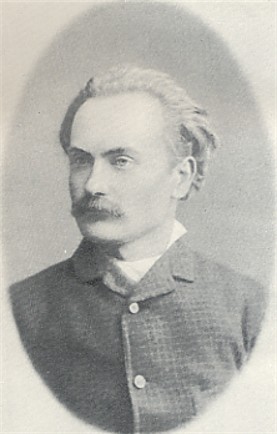
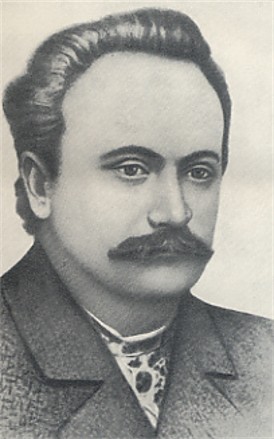
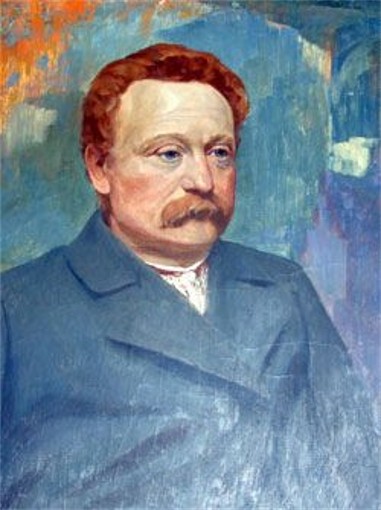
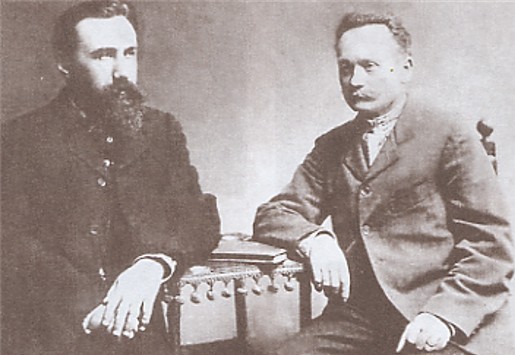
.jpg)
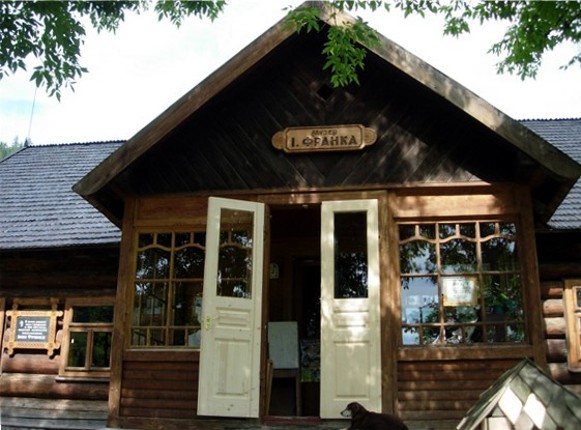
.jpg)
.jpg)
